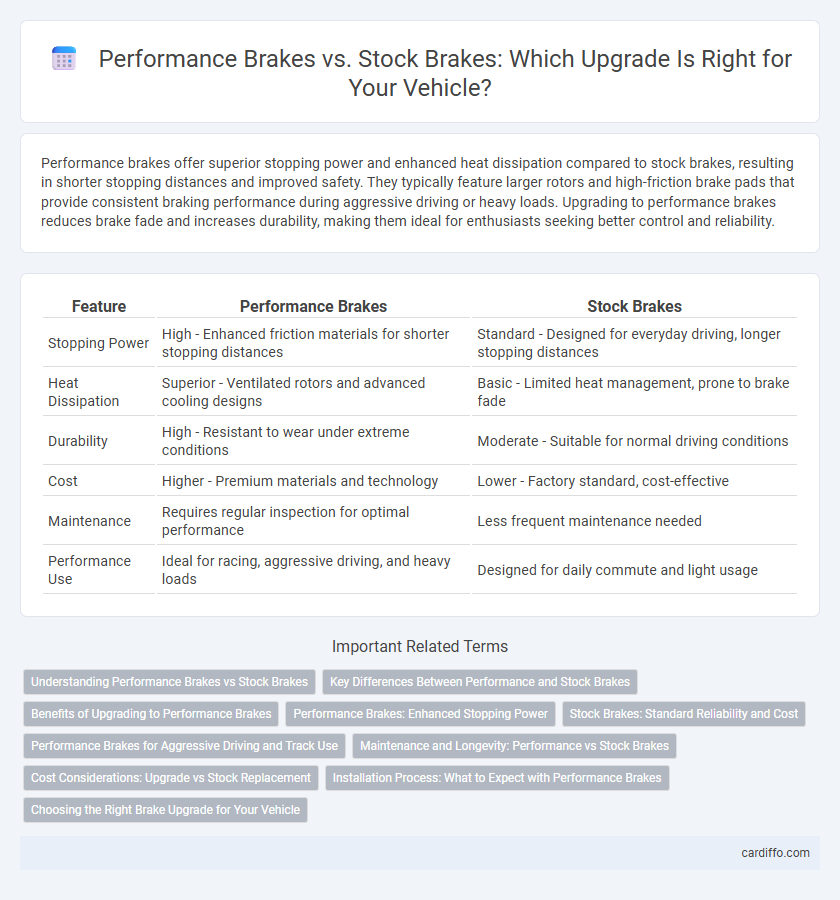Performance brakes offer superior stopping power and enhanced heat dissipation compared to stock brakes, resulting in shorter stopping distances and improved safety. They typically feature larger rotors and high-friction brake pads that provide consistent braking performance during aggressive driving or heavy loads. Upgrading to performance brakes reduces brake fade and increases durability, making them ideal for enthusiasts seeking better control and reliability.
Table of Comparison
| Feature | Performance Brakes | Stock Brakes |
|---|---|---|
| Stopping Power | High - Enhanced friction materials for shorter stopping distances | Standard - Designed for everyday driving, longer stopping distances |
| Heat Dissipation | Superior - Ventilated rotors and advanced cooling designs | Basic - Limited heat management, prone to brake fade |
| Durability | High - Resistant to wear under extreme conditions | Moderate - Suitable for normal driving conditions |
| Cost | Higher - Premium materials and technology | Lower - Factory standard, cost-effective |
| Maintenance | Requires regular inspection for optimal performance | Less frequent maintenance needed |
| Performance Use | Ideal for racing, aggressive driving, and heavy loads | Designed for daily commute and light usage |
Understanding Performance Brakes vs Stock Brakes
Performance brakes deliver superior stopping power and heat dissipation compared to stock brakes, reducing brake fade during aggressive driving or towing. They feature advanced materials such as carbon-ceramic or slotted rotors, combined with high-friction brake pads designed for enhanced grip and durability. Stock brakes, while adequate for everyday driving, typically lack the thermal management and responsiveness required for high-performance or heavy-duty applications.
Key Differences Between Performance and Stock Brakes
Performance brakes feature larger rotors and high-friction pads, enabling superior heat dissipation and reduced brake fade compared to stock brakes. These upgrade components deliver more consistent stopping power and enhanced responsiveness under demanding conditions like track driving or heavy towing. Stock brakes prioritize cost-effectiveness and everyday usability, often resulting in lower thermal capacity and less aggressive braking performance.
Benefits of Upgrading to Performance Brakes
Upgrading to performance brakes significantly improves stopping power, reducing braking distances and enhancing overall vehicle safety. Performance brakes offer better heat dissipation through advanced materials and designs, preventing brake fade during intense driving conditions. This upgrade also provides increased pedal responsiveness and durability compared to stock brakes, ensuring consistent performance over time.
Performance Brakes: Enhanced Stopping Power
Performance brakes deliver enhanced stopping power through advanced materials such as carbon-ceramic or high-carbon steel, which offer superior heat dissipation and reduced brake fade under extreme conditions. Their precision-engineered rotors and multi-piston calipers generate more consistent and stronger friction, significantly improving braking response and safety. Upgrading to performance brakes ensures shorter stopping distances and greater control during aggressive driving or emergency situations compared to standard stock brakes.
Stock Brakes: Standard Reliability and Cost
Stock brakes offer standard reliability with components engineered to meet basic safety and performance requirements, ensuring consistent stopping power under normal driving conditions. They provide a cost-effective solution for everyday use, requiring minimal maintenance and replacement expenses over time. While adequate for typical driving, stock brakes may experience decreased effectiveness during heavy or prolonged braking compared to performance brake systems.
Performance Brakes for Aggressive Driving and Track Use
Performance brakes deliver superior stopping power and heat dissipation compared to stock brakes, essential for aggressive driving and track use where repeated hard braking generates extreme temperatures. These upgraded braking systems feature larger rotors, enhanced calipers, and high-friction brake pads specifically engineered to reduce fade and improve pedal feel under sustained stress. Investing in performance brakes ensures consistent deceleration, increased safety, and better overall control during high-speed maneuvers and emergency stops.
Maintenance and Longevity: Performance vs Stock Brakes
Performance brakes typically feature advanced materials like carbon-ceramic or high-carbon steel, resulting in better heat dissipation and reduced wear compared to stock brakes. Maintenance intervals for performance brakes can be longer due to superior resistance to brake fade and corrosion, though replacement parts may be more costly. Stock brakes often require more frequent maintenance and pad replacements, but their initial affordability and widespread availability make them easier to service over time.
Cost Considerations: Upgrade vs Stock Replacement
Performance brakes typically cost more upfront compared to stock replacement brakes due to higher-grade materials and advanced engineering. While stock brakes offer a budget-friendly option with easier availability and lower labor costs, performance brakes provide longer lifespan and improved heat dissipation, potentially reducing maintenance expenses over time. Evaluating cost considerations involves balancing initial investment against enhanced durability and braking efficiency for the intended use.
Installation Process: What to Expect with Performance Brakes
Installing performance brakes typically requires more time and technical expertise compared to stock brakes due to the need for precise calibration and compatibility checks with existing components. The process often involves removing the stock rotors and calipers, followed by fitting larger, high-performance rotors and multi-piston calipers designed to enhance stopping power. Proper brake bleeding and testing are essential steps to ensure optimal brake responsiveness and safety after installation.
Choosing the Right Brake Upgrade for Your Vehicle
Performance brakes offer enhanced stopping power, better heat dissipation, and increased durability compared to stock brakes, making them ideal for high-speed or aggressive driving conditions. When choosing the right brake upgrade, consider factors such as vehicle type, driving habits, and brake pad materials, including ceramic, semi-metallic, or organic compounds. Selecting performance rotors and calipers that match your vehicle's specifications ensures optimal braking efficiency and safety on the road.
Performance brakes vs Stock brakes Infographic

 cardiffo.com
cardiffo.com